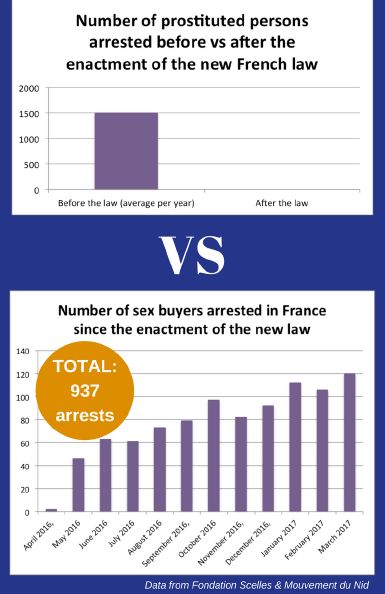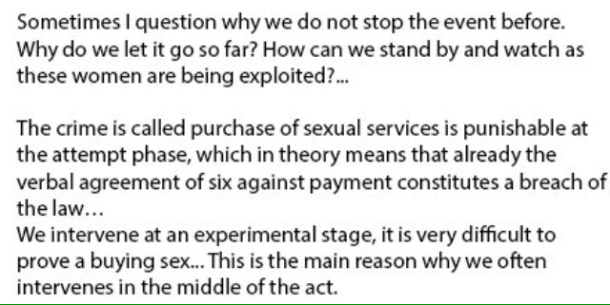The French law criminalising payment for sex was enacted a year ago Thursday, on 13th April 2016. Supporters marked its anniversary by (predictably) declaring it a success already, on pretty much the sole basis of purported arrest statistics. A typical example was this tweet from Feminist Current, which my friend Laura Lee alerted me to:
What’s Current: 937 johns, zero prostituted women arrested in France since adoption of Nordic model https://t.co/yBBSOJe6u3
— Feminist Current (@FeministCurrent) April 14, 2017
and it reminded me that I haven’t done a dodgy stats analysis in a while. So here we are.
The first step in any such analysis is to go to the source of the stat. So I read the Feminist Current blog post, which links to this news article and this press release from CAP International. (“CAP” stands for “Coalition for the Abolition of Prostitution”, in case you were wondering. Its current president is Sarah Benson of Ruhama.) Unfortunately, the news article’s source was the press release, and the press release’s source seems to be press releases from two other anti-sex work organisations:
At this point I replied to Feminist Current’s tweet to ask if they knew the actual source of those stats, but perhaps also predictably, they didn’t answer. So I did a search for “937” on the Mouvement du Nid site and found this article by the Abolition 2012 coalition, the title of which translates as “What harms prostitutes is not law, it is prostitution”. And a few paragraphs down we see the statement that
The clients are now accountable, 937 of them have been verbalized (figures from the Ministry of the Interior)
The word “verbalized” (verbalisés) is intriguing there, not being cognate with any legal term in English. I wasn’t sure if it could actually be translated to “arrested”, especially given France’s very different criminal procedures, and indeed it appears to be more analogous to “ticketed” according to the Council of Europe French-English Legal Dictionary. I’m not sure if this results in a criminal record, and would welcome any input from someone in the know. [Edit: see comments from Rikki de la Vega and Richard below.] As to the 937 figure, I can’t find it on the Ministry of the Interior website, though it could have been revealed in a Parliamentary Question or something. But it doesn’t ring untrue, and I have no reason to suspect it isn’t true; all I can say about this figure specifically is that in a country of 66 million people, the fact that 937 were ticketed for something last year doesn’t strike me as evidence of a real commitment to its eradication – far less as something actually likely to lead to its eradication.
What I was more interested in was the other statistic, that no sex workers had been arrested since the introduction of the law. This is what set off my bullshit detector, and sure enough, that same Abolition 2012 statement qualifies it rather significantly:
Since April 13, 2016, no more prostitutes have been arrested for soliciting and previous convictions on this count have been removed from criminal records. However, prostitutes are still arrested in certain cities that have issued anti-prostitution decrees…
Those “anti-prostitution decrees” are discussed further in this open letter to French presidential candidates, also issued by Abolition 2012. It states:
In particular, we would like to know what you will be setting up, once elected, on the following priority issues:
- Ending anti-prostitution laws targeting victims While France regards prostitution as violence and the law of 13 April 2016, in accordance with its abolitionist ambition, decriminalized prostitutes, certain municipalities in the national territory have rid themselves of these principles and of the law by adopting anti-prostitution decrees punishing the prostitutes themselves.
One might question whether a country can really be said to regard a thing as “violence” if the maximum penalty imposed for it is no more than what a large grocery store would get for destroying edible food, but rhetoric aside, it seems clear that the law has not actually had the impact on sex workers suggested by the Feminist Current tweet and its sources. It would be interesting to see the statistics from those municipalities, and to know what sort of penalties are being imposed – particularly for the undocumented migrants who sell sex in France.
And on that note, I’ll return to what I said earlier about arrest (or verbaliser) records forming the sole basis for such triumphalism in these statements. The CAP International statement acknowledges that the other elements of the French law have yet to be introduced:
French members of CAP international, Mouvement du Nid and Fondation Scelles, together with the 60 member organisation of the collective Abolition 2012, are now prioritising the effective implementation of newly recognised rights for victims of prostitution and trafficking:
- Legal, psychological and medical support,
- Access to exit programmes,
- Emergency and social housing,
- Financial assistance,
- Temporary residency permits,
- Access to training and to decent work
Similarly, the Abolition 2012 letter to presidential candidates goes on to call for:
- The opening of shelters for victims of prostitution, procuring and trafficking in human beings in shelters and social reintegration.
- Access to the free tax debts.
- Access to a residence permit for foreign victims.
- The provision of financial assistance for social and vocational integration for prostituted persons who do not benefit from social minima or assistance granted to persons seeking asylum.These basic provisions must be put in place as soon as possible throughout the country.
It never ceases to amazes me that anti-sex work feminists don’t insist on these basic provisions being put in place before measures that deprive sex workers of their income. What do they really expect to happen to these people in the meantime?
Finally, one more thing in that open letter jumped out at me: the admission by Abolition 2012 that the law is doing absolutely fuck all against the online sex industry:
The law clearly and strictly defines what is involved in procuring, including “taking advantage of the prostitution of others, sharing products or receiving subsidies from a person habitually engaging in prostitution; Act as an intermediary between two persons, one of whom engages in prostitution and the other exploits or pays for the prostitution of others”. Yet, major actors in bringing prostituted persons and prostitution clients into contact continue to profit financially from prostitution, handsomely, without ever being disturbed. On the Internet, where ad serving is growing exponentially, which would fall under pandering in any other context, it seems commonly accepted. But this tolerance deprives of useful effect any new measure designed to discourage demand and create alternatives for prostitutes. Every week in the national and local press we learn that websites, whether general or specialized, have not only facilitated the prostitution of others but have also benefited greatly from it.
So let’s review. According to the law’s biggest cheerleaders in France, sex workers continue to be targeted and punished by municipal authorities; internet prostitution continues unabated, thereby depriving “end demand” measures of any useful effect; and nothing has yet been done for any sex workers who are struggling to make a living under this law, which I presume are likely to be those who are street-based and therefore particularly vulnerable. In that context, are those 937 fines really cause for celebration?
Let me be clear that I absolutely welcome the removal of solicitation from the criminal code. And I am glad to see Abolition 2012 and CAP International keeping positive assistance to sex workers on the agenda, even if it really should have been their priority to start with. But press statements suggesting that the law is already a success are not only highly disingenuous, but potentially damaging to that agenda. By continuing to centre a criminal justice approach to the sex industry, and in a way that invites the French government to declare itself as “doing something” for abolition, they mute their own calls for the social and immigration reforms that are absolutely vital to actually reduce the size of the industry in France. They make it oh so easy for the government to continue to drag its heels on creating those alternatives for sex workers, because hey look what a good job we’re doing arresting clients! Which is what you were campaigning hardest for anyway, right?
Of course, these statements lauding the success of the new law aren’t really aimed at the French government anyway. They’re aimed at people who opposed the law to begin with, and people in other countries where it’s currently under consideration. They’re a way of putting a shiny spin on the law, to defend it from its detractors at home and abroad. But the problem with shiny things is they can blind you. I think we’ve already seen that happen in Sweden and Norway, where the level of denial among those who want to maintain client criminalisation can sometimes reach ludicrous heights. Earlier this month, I attended a conference addressed by Per-Anders Sunesson, Sweden’s “Ambassador at Large for Combating Trafficking in Persons”, during which he made the remarkable claim that since the sex purchase ban was introduced there had not only been no murders of sex workers, but not even one single complaint of violence against a sex worker. When I pointed out that Sweden’s own police reports stated otherwise, his reply was “Maybe you’re reading them wrong.”
So what I’d say to supporters of the French law, if you really do want to see it implemented in full and not just the headline provisions of it, is this: forget about us. Stop trying to persuade us (or those who might hear us) that we were wrong about client criminalisation, and start really holding the French government to account for continuing to allow persecution of sex workers by local and immigration police, for failing to ensure that sex workers who want to exit have the resources to do so. Stop centring sex workers’ clients and putting so much of your energy into campaigning against them. From here on, the welfare of those you call “prostituted persons” should be the focus of at least as much energy – or the government will do no more than bare minimum to implement social and immigration reforms, which will end up reforming nothing and leaving vulnerable and exploited sex workers just as vulnerable and just as exploited. And still selling sex.
Don’t let France get away with this while you’re busy crowing about numbers of “arrested johns”.


 Photo by Eamonn Brown Photography
Photo by Eamonn Brown Photography



















